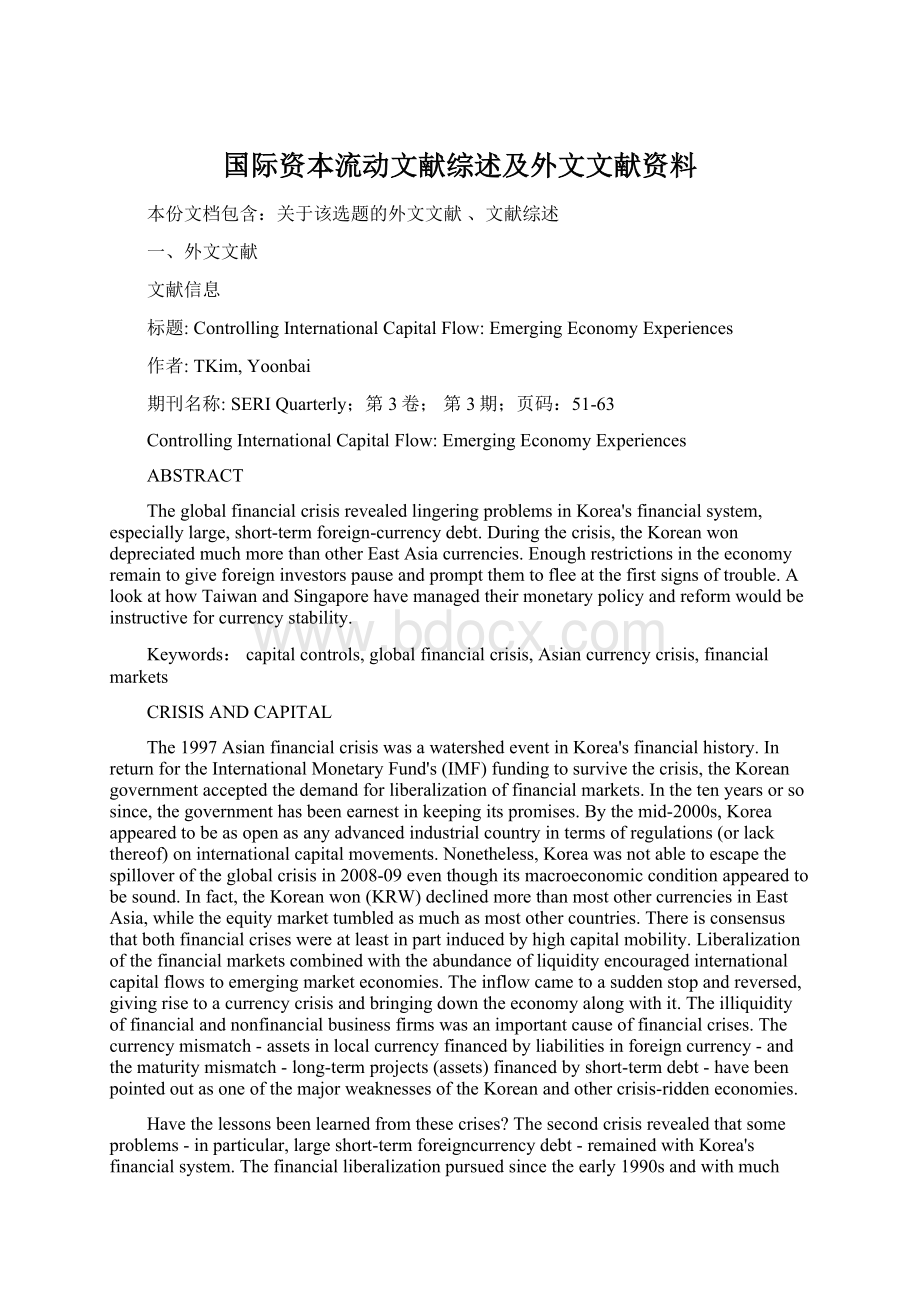国际资本流动文献综述及外文文献资料.docx
《国际资本流动文献综述及外文文献资料.docx》由会员分享,可在线阅读,更多相关《国际资本流动文献综述及外文文献资料.docx(10页珍藏版)》请在冰豆网上搜索。

国际资本流动文献综述及外文文献资料
本份文档包含:
关于该选题的外文文献、文献综述
一、外文文献
文献信息
标题:
ControllingInternationalCapitalFlow:
EmergingEconomyExperiences
作者:
TKim,Yoonbai
期刊名称:
SERIQuarterly;第3卷;第3期;页码:
51-63
ControllingInternationalCapitalFlow:
EmergingEconomyExperiences
ABSTRACT
TheglobalfinancialcrisisrevealedlingeringproblemsinKorea'sfinancialsystem,especiallylarge,short-termforeign-currencydebt.Duringthecrisis,theKoreanwondepreciatedmuchmorethanotherEastAsiacurrencies.Enoughrestrictionsintheeconomyremaintogiveforeigninvestorspauseandpromptthemtofleeatthefirstsignsoftrouble.AlookathowTaiwanandSingaporehavemanagedtheirmonetarypolicyandreformwouldbeinstructiveforcurrencystability.
Keywords:
capitalcontrols,globalfinancialcrisis,Asiancurrencycrisis,financialmarkets
CRISISANDCAPITAL
The1997AsianfinancialcrisiswasawatershedeventinKorea'sfinancialhistory.InreturnfortheInternationalMonetaryFund's(IMF)fundingtosurvivethecrisis,theKoreangovernmentacceptedthedemandforliberalizationoffinancialmarkets.Inthetenyearsorsosince,thegovernmenthasbeenearnestinkeepingitspromises.Bythemid-2000s,Koreaappearedtobeasopenasanyadvancedindustrialcountryintermsofregulations(orlackthereof)oninternationalcapitalmovements.Nonetheless,Koreawasnotabletoescapethespilloveroftheglobalcrisisin2008-09eventhoughitsmacroeconomicconditionappearedtobesound.Infact,theKoreanwon(KRW)declinedmorethanmostothercurrenciesinEastAsia,whiletheequitymarkettumbledasmuchasmostothercountries.Thereisconsensusthatbothfinancialcriseswereatleastinpartinducedbyhighcapitalmobility.Liberalizationofthefinancialmarketscombinedwiththeabundanceofliquidityencouragedinternationalcapitalflowstoemergingmarketeconomies.Theinflowcametoasuddenstopandreversed,givingrisetoacurrencycrisisandbringingdowntheeconomyalongwithit.Theilliquidityoffinancialandnonfinancialbusinessfirmswasanimportantcauseoffinancialcrises.Thecurrencymismatch-assetsinlocalcurrencyfinancedbyliabilitiesinforeigncurrency-andthematuritymismatch-long-termprojects(assets)financedbyshort-termdebt-havebeenpointedoutasoneofthemajorweaknessesoftheKoreanandothercrisis-riddeneconomies.
Havethelessonsbeenlearnedfromthesecrises?
Thesecondcrisisrevealedthatsomeproblems-inparticular,largeshort-termforeigncurrencydebt-remainedwithKorea'sfinancialsystem.Thefinancialliberalizationpursuedsincetheearly1990sandwithmuchmorevigorafterthe1997crisishasleftthevulnerablesegmentofthefinancialsectorintactorevenmoreexposedtoexternalorinternalshocks.
WereviewtheexperiencesofSingaporeandTaiwan,bothofwhichweatheredthe1997crisisbuthadtoendurethe2008crisisalongwithKorea.However,despitetheirhighexportdependencyandsmallereconomicsize,theextentofcurrencydepreciationwasmuchsmallerthanthatoftheKoreanwon.Totheextentthatexchangeratestabilityisimportantforsoundmanagementofmacroeconomicenvironments,weshouldleamfromtheirexperiences.
Thetwocrises,especiallytherecentone,havebroughtsomemajorchangesinourunderstandingofinternationalcapitalmovementanditsregulations.Oneisthechangingperceptionaboutcapitalcontrols.Inarecentglobalfinancialreport,theIMFadmittedthatcapitalcontrolswereacomplementarypolicytoolinagovernment'stoolkitfordealingwithsurgesofcapitalthatcandisruptexchangeratesorassetprices.1ThenewstudyfoundthatsuchcapitalcontrolshelpedbufferagainstsomeoftheworsteffectsofthefinancialcrisisinemergingmarketeconomiessuchasColombia,Brazil,India,Thailand,andChina.AcademicssuchasDaniRodrikandGuillermoCalvohavebeenwarningaboutthepotentiallyharmfuleffectsof(short-term)internationalcapitalinflowsandadvocatingareexaminationofthestandardIMFprescriptionfordevelopingcountriesoraid-recipientcountries.ThechangeinthepositionoftheIMFisremarkableasithadpreviouslyadvocatedunrestrictedflowofmoneyandcapitaltoandfromanycountries,regardlessoflevelofdevelopment.Inthisarticle,wereexaminetheroleofcapitalcontrolsinthecontextoftheKoreaneconomyandtheglobalfinancialcrisis.
STORYOFTWOCRISESINKOREA
Figures1and2showthemovementofthestockpriceindicesandexchangeratesagainstthedollarforsevenEastAsiancountriesfromJanuary1990toApril2010.BothareinlogarithmandshownasdeviationsfromthebaseperiodofJanuary2002,whichischosenarbitrarilyandroughlythemidpointbetweenthetwocrises.Themagnitudesofthestockmarketdeclinesduringthe1997crisisarewellknown.Allstockindicesfelldrasticallyduringthe2008globalfinancialcrisis.Inthefivecrisis-riddencountriesshowninFigureIA,stockpricesfell50percentormore.Thedeclinesinstockpricesduringthe2008crisisinSingaporeandTaiwanasshowninFigureIBarecomparabletothoseofKorea's.Inallthreecountries,thestockpricefellbyabout50percentonaverage,andtheoverallpatternofmovementsissurprisinglysimilarinKoreaandSingapore.However,Taiwanseemstohavehadmuchlessvolatilityinthestockmarketovertwentyyears.
Themovementsoftheexchangerateswerequitedifferent.ThelargedeclineoftheIndonesianrupiah(IDR)duringthe1997crisisandthefollowingrecoveryismostnoticeable.TheMalaysianringgit(MYR)washeldatafixedexchangeratesoonafterthe1997crisisuntil2005.TheKoreanwondepreciatedlessthantheIndonesianrupiahortheThaibaht(THB),depreciatedmorethantheSingaporedollar(SGD)ortheNewTaiwandollar(TWD).ThefluctuationsafterthecrisisweresurprisinglysimilarinallcountriesinFigure2Aalthoughtherupiahshowedsomewhatgreatervolatilityforafewyearsafterthe1997crisis.Allfivecurrencieshadmassivedepreciationduringthe2008crisis.Duringtherun-uptothe2008globalcrisis,theKoreanwonhadshownquitedistinctivemovement.Itappreciatedmostinthe2005-07period.Afterwards,itdepreciatedmorethananyothercurrency,collapsingbymorethan40percentcomparedtotherecentpeak.Therupiahisnextwithdepreciationoflessthan30percent.ThecurrenciesofSingaporeandTaiwanshowninFigure2B(andThailand)havebeenmuchmorestable,depreciatingalittlemorethan12percent.
WhydidthewonfallmuchmorethanothercurrenciesinEastAsia,inparticular,theSingaporeorTaiwandollar?
GiventhatthecrisiswasessentiallyimportedfromtheUnitedStatesandEuropeancountriesandthatSingaporeandTaiwanhavemuchgreaterexportdependencyratiosthanKorea,onewouldexpectthewontohavedepreciatedless.Onecanconjecturethatthemaintransmissionchanneloftheglobalcrisiswasmorelikelyinthefinancial-morespecifically-theforeignexchangesectorratherthanintherealsectorsuchasinternationaltradeofgoodsandservices.
LIBERALIZATIONOFKOREANFINANCIALMARKETS
EarlystagesofrapidgrowthinKoreaoccurredinthepresenceofextensivecontrolsoninternationalcapitalflowsaspartofamoregeneralpolicyoffinancialrepression.2Financialliberalizationduringthe1980swascautiousandslow,andthesystemremainedtightlycontrolleduntiltheearly1990s.TheliberalizationprocesswasgreatlyacceleratedundertheKimYoungSamgovernment(1993-97).Afive-yearfinancialliberalizationplanwasaimedat,amongotherthings,interestratederegulation,abolitionofpolicyloans,grantingofmoremanagerialautonomytobanks,reductionofentrybarrierstofinancialactivitiesand,mostimportantly,capitalaccountliberalization.3Theresultwasarapidincreaseinforeigndebt.Aspartoffinancialreform,bankswereallowedtoopenandexpandoperationsoverseas,whichledtoasharpincreaseinforeigncurrencyliabilitiesofoverseasbranchesthatwasalmostaslargeastheexternaldebtsofdomesticbranches.Foreigndebtnearlytrebledfrom$44billionin1993to$120billioninSeptember1997,ontheeveofthefinancialcrisis.
Korea'sdebtwasconsideredwithinasustainablerangealthoughitwasgrowingfast.OnecriticalprobleminKorea'sdebtstructurewasitsmaturitystructure.Theshareofshort-termdebt(lessthanayear'smaturity)oftotaldebtrosefrom47.3percentin1993toanastonishing58.3percentattheendof1996.Therapidbuildupofshort-termforeigncurrencydebtwasledbymerchantbanksthatwerenewlylicensedbytheKimgovernment.Moreover,supervisionofthemerchantbankswasvirtuallynonexistent.Thegovernmentwasapparentlynotevenawareofthehugemismatchinthematuritystructurebetweenborrowingandlending:
while64percentoftheir$20billiontotalforeignborrowingwasshort-term,85percentoftheirlendingwaslong-term.
Liberalizationthatprecededthe1997crisiswasquitepartialandfrequentlyviolatedstandardeconomicadviceabouthowliberalizationshouldproceedintermsofthenecessarypreconditionsandsequencing.ThetotalamountofdomesticandinternationalfinancialliberalizationundertakenbyKoreabeforethe199798crisiswasfarlessthanisoftenassumed.EvenwiththecompletionoftheOrganizationforEconomicCooperationandDevelopment(OECD)applicationplan,theKoreanfinancialsystemwouldhaveremainedamongthemostrepressedinAsia.4PresidentKim'sdesiretojointheOECD,combinedwithpressuresfromtheIMFandtheUSgovernment,mayhaveledtotheliberalizationofdomesticfinancialmarketsbeforeexistingweaknessesinthebankingsystemcouldbeaddressed.5
PerhapsthestrangestaspectofKorea'sliberali